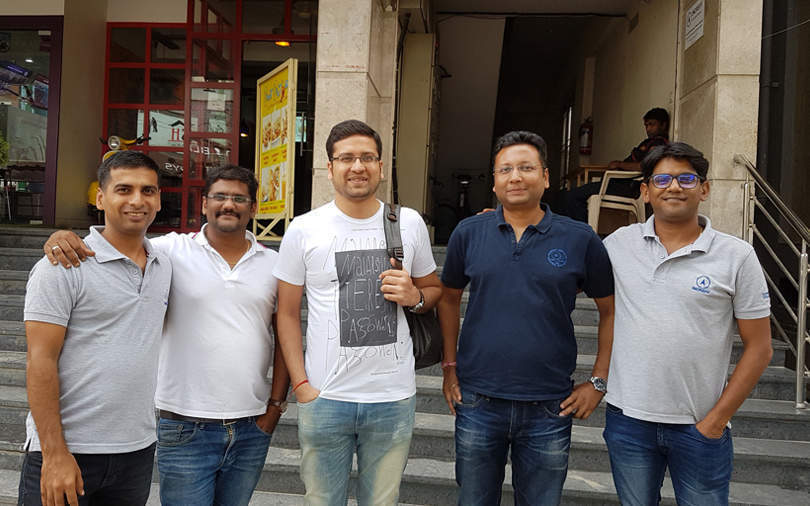
This Binny Bansal-backed startup thinks it can transform supply chain management


During their time at Myntra, Anshuman Agarwal and Rajul Jain often pondered over how they could help retailers on the fashion e-commerce portal better manage their inventory and boost sales.
The fashion industry is forever in transition, Agarwal told TechCircle. This makes it almost impossible to predict demand and control the supply chain accordingly.
“In India, most fashion brands and retailers do two or three inventory turns in a year at the most, whereas global players like Zara do 10-12 inventory turns in a year,” said Agarwal, who played a key role in the warehousing and logistics operations at Myntra.

Inventory turnover is a measure of the number of times inventory is sold or used in a time period.
Along with Jain, who looked after supply chain operations at Myntra and co-founded fashion retail platform yebhi.com, Agarwal too felt that stock keeping units (SKUs) did not have sufficient depth to encompass the dynamic nature of fashion.
The duo considered this problem of ‘inventory inefficiency’ urgent enough to branch out and float their own startup. In 2016, they founded Increff to bring about ‘incredible efficiency’ in supply chain management.

While Agarwal (COO) and Jain (CEO) would draw on their operational expertise, third co-founder Romil Jain (CTO and former executive at Ngpay) would drive the data and technology operations that were to form the core of Increff’s identity.
Their mission: helping retailers figure out what, when and how much to make or sell apart from setting the right price and curbing the demand-supply mismatch. This, in turn, would translate to significant and sustainable increases in sales and margins and reduction in working capital for brands and retailers.
The trio spent the next two years building the startup’s two technology platforms -- IRIS and ASSURE.

Efficiency drive
IRIS is a merchandising platform that helps brands “understand their demand pattern accurately at the very granular level”.
Simply put, it is a predictive analytics platform that keeps track of historical data related to sales, inventory and discounts to equip brands with intelligence to efficiently plan the purchase and distribution of their merchandise.

IRIS is a self-learning model that runs on a backbone of 300-plus algorithms. “There is no other tool in India and globally as well that does this kind of detailed analytics at a granular level, meaning data analysis at the SKU level. This includes observing inventory sales at every sales point,” said Agarwal. “For a brand with a thousand stores, we treat each store as a unique sales point.”
Among the clients for IRIS include WROGN, the apparel brand co-owned by Indian cricket captain Virat Kohli. Increff claims that its assistance on the distribution side has helped boost WROGN’s zero-discounting sales growth from 36% to 50% in a particular season. IRIS is also running pilots with large fashion brands.
The platform takes a cut from the brands’ sales growth on a monthly basis.

“As we typically end up delivering 15-20% revenue growth and 4-5% margin jump, we collect a percentage on the sales,” said Agarwal, who has previously worked with companies such as ITC, Boston Consulting Group and FreshMenu.
Bengaluru-based Increff’s other main offering is ASSURE, a SaaS-based inventory and order management platform, which helps brands showcase 100% of their available inventory on all their sales channels both online and offline.
“We give a serial number to each of the hundred T-shirts of a given type rather than just tagging them as SKUs,” Agarwal explained. This enables stores to keep track of the whereabouts of each unit at any given time.

ASSURE is made available to brands as a technology platform apart from offering warehousing services, wherein it partners with third-party logistics providers to run and manage client warehouses.
ASSURE’s SaaS and WaaS offerings are available on a pay-per-use basis. Its client roster includes the likes of Puma, Mango and Roadster.
Agarwal said that ASSURE helps slash manpower costs by 30-40%. “The need for data-entry operators, supervisors or managers comes down drastically in our process,” he added.
Making it count
Agarwal said that IRIS stands out with its intelligent, self-learning model. Other players in India, he said, offer tools for automating operations at best.
ASSURE, however, has a number of global competitors in the form of offerings from SAP, Navision and Unicommerce, among others.
Either way, Flipkart co-founder Binny Bansal was certainly impressed.
“Bansal had said that both these products have great value, specifically IRIS, and we should not waste any time in going global with them,” said Agarwal.
Two months ago, Bansal and venture capital firm 021 Capital invested in Increff’s Series A round of funding worth $3 million.
"Most businesses have huge inefficiencies linked to their supply chain. It ranges from problems at each stage -- from forecasting to inventory management to distribution," said Sailesh Tulshan, chief executive officer of 021 Capital. "Increff has built a technology solution for such 'many-variable' problems. User brands/businesses will see the efficiency gains flowing directly into their balance sheets.”
With fresh capital in its kitty, Increff plans to beef up its global presence in the Middle East and the UK in particular.
NextSCM Solutions Pvt. Ltd, which operates Increff, had previously raised $2 million in 2017 in a seed round of funding from Sequoia Capital and warehouse robotics firm GreyOrange, among others.
With the latest investment, the company plans to strengthen its product suite by beefing up features of its platform such as transaction technology (that will allow inventory to be exposed across channels and customer touch-points, enabling significant improvement in inventory efficiency), merchandising solutions (that will allow smart buying, distribution, and promotion/markdown management), and visual intelligence (to allow brands access to visual intelligence on latest trends).
